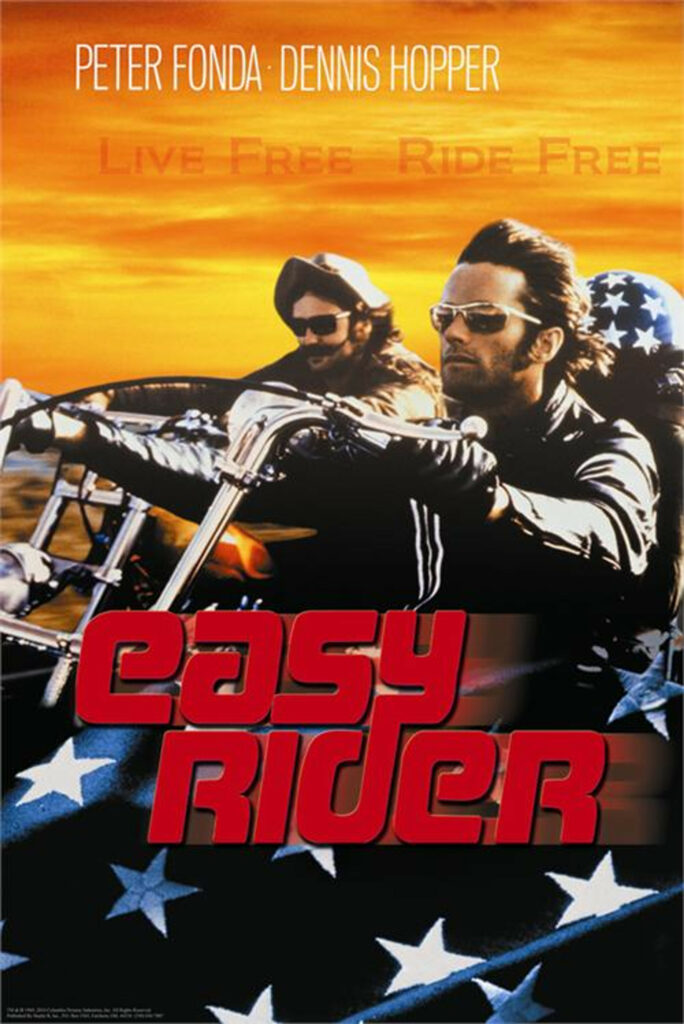For my final class post the cultural resource that I thought would be fun to examine is one of my favorite films, Easy Rider (1969). I believe it represents both a reimagined alternative and commentary to the cultural tensions of the late 1960s. “Americans are a restless people, imbued with a kind of nervous energy that manifests itself culturally through the mediums of literature, film, and music.” (Ireland).
The film follows the story of Billy and Wyatt aka “Captain America” on their eventful motorcycle journey from Los Angeles to New Orleans.
“This film presents something fairly alien in cinema, especially within the Western genre: two characters attempting to escape from a country they never asked for, in any way that they can. It defies as many conventions of American cinema as it does conventions of American social life.” (Inquiries Journal). I believe that the themes and elements that are portrayed in the film reflect an important and timeless question on the true meaning of freedom and the theoretical American dream.

Easy Rider begins with the two central characters acquiring a substantial amount of money from selling cocaine that they smuggled from Mexico to California. “According to the ideal of the American Dream, everyone deserves the opportunity to pursue happiness and economic prosperity, and the government should protect the right of every citizen to achieve their highest aspirations and goals. The notion of the American Dream was invented by the founders of the United States and was initially captured by language in the Declaration of Independence.” (Investopedia). Despite this, I’m not sure if others in the film would necessarily agree with the way of how Billy and Wyatt achieved their financial success. Nonetheless it allowed them the freedom to retire and move to Florida, their ultimate goal in the film.
With their finances secured, the pair begin the scenic motorcycle journey to their mid-stop destination: Mardi Gras. “Wyatt’s bike has the American flag painted over its engine, in which he hides his drug money. The bike becomes a metaphor for the country which is fueled by retroactive violence and drug money.” (Far Out).
They meet characters during their journey that portray and represent different depictions of freedom and happiness in American life. During a parade mishap they end up in a rural jail and encounter an individual named George Hanson (played by a young Jack Nicholson), a well-liked town lawyer who is sleeping off his drunken night in his local cell. While the police give Billy and Wyatt a hard time for their appearance and overall demeanor, they have a friendly exchange with George, who helps get them out of jail.
“George is the one with the speeches that underscore what the film is about: ‘This used to be a helluva good country. I can’t understand what’s gone wrong with it.’ It’s not the long hair or the way they dress that upsets people, he tells Billy and Wyatt. ‘What you represent to them is freedom.’ He warns: ‘Course don’t ever tell anybody — that they’re not free, ‘cause then, they’re gonna get real busy killin’ and maimin’ to prove to you that they are” (Wolf).
Soon after this speech, George is killed while sleeping peacefully in a violent attack by local men whom they had encountered earlier in the day, who had an open and apparent disdain for the trio who had entered their small Texan town.
“The counter-culture of the 1960s expresses the dissatisfaction with the state of culture and society and looks for ways to resist, it desires to stand out, it longs for individualism and self-conscious expression of oneself. As the term itself indicates counter-culture is culture standing in opposition to what may be perceived as traditional culture based on certain sets of rules.” (Masaryk University).
After this tragic event, Billy and Wyatt continue traveling to Mardi Gras. They visit a brothel and meet two prostitutes, all deciding to venture out to the festival and later consuming acid together in a cemetery (in one of the most famous scenes of the film). The pair sit beside a bonfire afterwards, resting before resuming their journey to Florida. “Their search ends in failure and death. Before a bonfire outside New Orleans, Wyatt utters the famously enigmatic line, ‘We blew it.‘ They are just about to make it to Florida, flush with cash. But something nags at Wyatt’s conscience. Like all tragic heroes, Wyatt and Billy have somehow missed the mark.” (Commonweal).
The film has a violent and abrupt conclusion; while riding together on a country road, a pickup truck pulls up alongside Billy and Wyatt and begins to taunt and harass them. Unphased, Billy communicates a middle finger back to the men in the truck. Angered by his cavalier response, the men in the truck retaliate by blasting the pair with a shotgun.
“While the film generated substantial debate, critics from the alternative and mainstream presses alike generally saw it as a spectacular document of its times that effectively represented the hippie ethos as well as the serious rifts between counter- and dominant cultures.” (Klinger).
Easy Rider as a film suggests that freedom is attainable in many different walks of life and cultures. Some individuals, however, will be looking to suppress that freedom. Being a George Hanson in society is an important step to start bringing along positive societal changes.